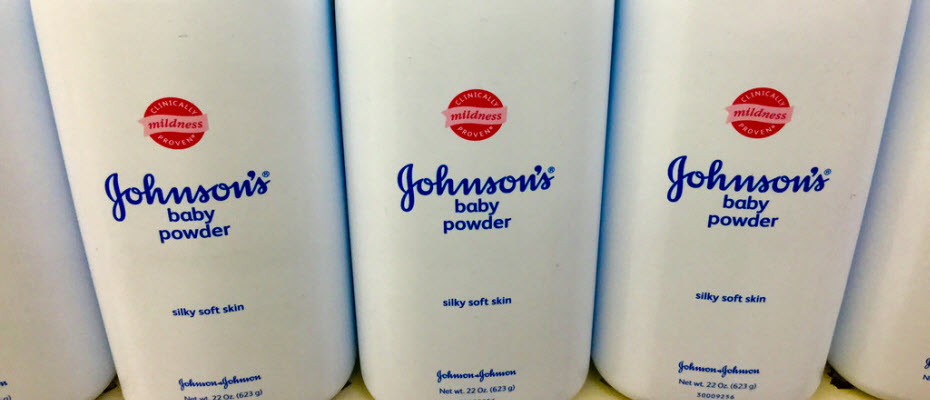A jury in St. Louis awarded $110.5 million to a woman who developed ovarian cancer after using Johnson & Johnson’s Baby Powder and Shower to Shower products for more than 40 years. The civil defective and dangerous product lawsuit centered on the questions of whether the talcum powder maker had a duty to warn the plaintiff of cancer risks and whether the company failed to meet that duty.

Failure to Warn
Talc has been included in personal hygiene products and cosmetics for more than 100 years. The mines that supply the soft mineral also often contain asbestos, and talcum powder manufacturers have had to certify their products as asbestos-free since the 1970s.
Around the same time that concerns over asbestos contamination became public, anecdotal reports of higher instances of ovarian cancer and other forms of genitourinary cancers among women who frequently applied talc surfaced. Companies like Johnson & Johnson downplayed those potential medical problems then and have continued arguing that strong scientific proof of a connection between talc and cancer in women has not emerged.
With the May 4, 2017, decision in Slemp v. Johnson & Johnson et al., a total of nearly $197 million has been awarded to women diagnosed with cancer after decades of talcum powder use. One such case was decided in the company’s favor by a jury, and judges have dismissed at least two other plaintiffs’ claims for lack of evidence.
When dying women or their families have prevailed, they succeeded in showing that Johnson & Johnson failed to warn talcum powder users of possible, if not guaranteed, health problems. Justia, a widely consulted legal guide, defines product makers’ duty to warn as the obligation to “warn of hidden dangers in a product and how to use the product to avoid dangers and use it in a safe manner.”
To require a warning, a risk must be more than negligible, but it does not need to threaten more than a small number of users if it is serious enough. For instance, most drug side effect warnings concern problems that affect fewer than 3 percent of patients. Regarding talcum powder, specifically, the International Agency for Research on Cancer lists talc as possible cause of cancer when it is applied to the genitals.
Product manufacturers can be held responsible for paying compensation and damages to people who get harmed by their products when they fail to meet their duty to warn. Justia summarizes this legal principle this way: “Even when there is no design flaw, nor any manufacturing defect, a product can be defective because of inadequate instruction or lack of appropriate warnings. … A failure to warn is considered a marketing defect in a product liability case.”
Holding Defective Product Manufacturers Accountable
The plaintiff who received the $100-plus million, identified in multiple news reports as Lois Slemp, of Wise, Virginia (VA), was diagnosed with ovarian cancer in 2012 and was too ill to attend the final hearings in her lawsuit. Since Johnson & Johnson has vowed to appeal the jury’s ruling, she may not live to accept any of the money owed to her for the company’s negligence.
Manufacturers of dangerous and defective products sometimes count on the length and difficulty of the civil lawsuit process to discourage injured and ill people so much that plaintiffs lose hope and give up. My Virginia defective product attorneys and I applaud Slemp and her legal team of Ted Meadows, Danielle Mason and David Dearing of Beasley Allen and Allen Smith of the Smith Law Firm PLLC for persisting.
EJL








